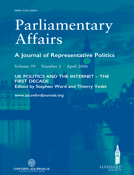-
Views
-
Cite
Cite
Jenny Pickerill, Radical Politics on the Net, Parliamentary Affairs, Volume 59, Issue 2, April 2006, Pages 266–282, https://doi.org/10.1093/pa/gsl008
Close - Share Icon Share
Extract
INFORMATION communication technologies (ICTs) have been employed for radical politics since their inception. Radical politics in the context of this article refers to use of ICTs by activists engaged in collective action campaigns often aligned to specific social movements (such as peace, social justice, environmental and anti-capitalist). Such activists believe they are involved in progressive activities, which contribute to a broader reinvigoration of democracy and as such are concerned with social justice and environmental debates. Moreover, radical activists tend to populate the less formal grassroots style of campaigning (as opposed to the more established and largely hierarchical non governmental organisations), occupy the left, rather than the right, wing political landscape and reject the use of violence (which is of particular significance in this era of the ‘war on terror’).
The examples in this article are drawn from a range of empirical projects undertaken by the author into radical politics since the mid-1990s. These have incorporated participant observation into environmental activists’ use of ICTs, exploration of Indymedia collectives and two ongoing research projects into anti-capitalist activities and Internet use by those involved in the anti-war movement in Britain.




